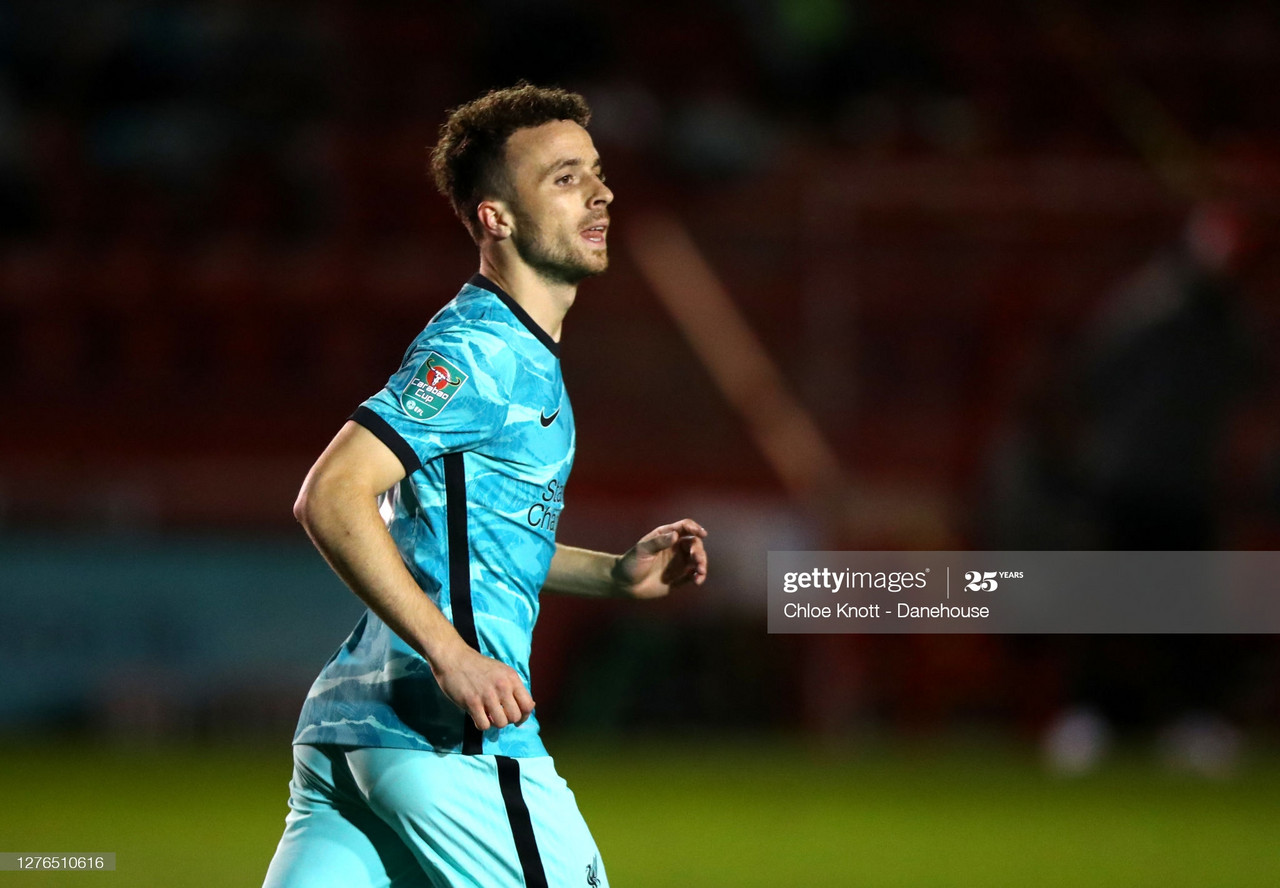Liverpool cruised into the last 16 of the Carabao Cup on Thursday night, rolling seven past League One side Lincoln City.
Takumi Minamino and Curtis Jones both scored twice for the much-changed Reds.
Elsewhere, there were debuts for two recent arrivals. Kostas Tsimikas started the game at left-back, while Diogo Jota played the last half-hour after sealing his £40million switch from Wolves last weekend.
We spent the game focusing on the pair to learn more about their playing styles, strengths and any possible weaknesses.
Kostas Tsimikas – attacking contribution
Tsimikas predominantly took up a similar position to the Reds’ no.1 left-back Andrew Robertson, stretching the play as much as possible on the left touchline. He constantly made himself available for a pass, and when on the ball he frequently looked for a rapid give-and-go with Xherdan Shaqiri or Takumi Minamino, who were granted almost total positional freedom.
Much like Robertson and Trent Alexander-Arnold, Tsimikas and Neco Williams looked to find one another by switching the play. The Greek international picked out one particularly precise cross-field pass just before the 15-minute mark.
Also of note were his set-piece responsibilities: he took a corner from the left and delivered a free-kick from the right, both of which narrowly evaded their targets.
He had one crack at goal himself, sidefooting wide from the edge of the area after offering a narrower option.
What, though, about his crossing? In this team, that will always be the element of his game that faces the most scrutiny.
By our calculations, he attempted seven crosses in the match. Quantity-wise, that’s fairly decent, albeit in a game where Liverpool completely dominated the ball. On a few occasions he looked to dart beyond his man before delivering, necessarily keeping his head down and hoping he could pick out the right area.
In terms of accuracy, it’s less encouraging on paper – only one of the crosses wound up creating a chance for a team-mate. That came 17 minutes in when a powerful ball was taken down and skewed wide by Jones.
Of the remaining six, two were caught by the goalkeeper and four were cleared by the defenders. It was frustrating at times, but equally he perhaps ought to have had an assist when he invitingly clipped the ball invitingly into the front post 10 minutes into the second half, only for the enigmatic Divock Origi to shy away from attacking it.
Defensive awareness
Going the other way, there were moments when Tsimikas needed to be more alert and more tenacious, League Cup or otherwise.
The first of these came shortly before the half-hour mark. To his credit, Tsimikas had been on hand to turn a dangerous low cross behind at the back post moments earlier. But that good work was nearly undone when opposite number Max Melbourne dropped his shoulder and went past him before menacingly putting the ball back in the mixer.
Shortly before half-time, he likely received an earful from Virgil van Dijk, who allowed himself to be drawn out wide expecting Tsimikas to cover the central area. He did not drop-in, and James Jones found himself with a free header in the unguarded zone, charitably flicked onto the side-netting.
Early in the second half, Jones evaded him too easily again. This time, Tsimikas cleared the ball out to the edge of the area and looked to close his man down, but did little to restrict his space before a threaded ball into Tayo Edun which ought to have resulted in a goal.
For the most part, the issue was that Tsimikas was allowing too much time for crosses from Lincoln’s right-hand side. Lincoln very nearly scored from these situations in the 53rd and 77th minutes.
It wasn’t deeply concerning by any means, and maybe it can be put down to being caught cold on the rare occasions when Liverpool had to shuffle back into shape, but Tsimikas will need to be much more switched-on when, as expected, he gets opportunities against high-level opponents.
A glimpse of Diogo Jota
Jota’s tangible contribution during this 35-minute cameo was limited. It was his low cross which deflected (wildly) out to Marko Grujic for the sixth Liverpool goal, and he went close himself after receiving the ball between the lines and playing a neat one-two with Naby Keita. That driven effort, which beat the left-hand post, was his brightest moment.
Still, his movement was interesting. The first time he had the Lincoln defence worried was five minutes after his introduction; Grujic picked up the ball in plenty of space around the half-way line and Jota set off in-behind. The Serbian did not take note of this run nor a near-identical stoppage-time dart. The second occurrence left Jota visibly frustrated.
It was the kind of incisive long ball Jordan Henderson and Fabinho are always looking to execute. Look no further than the Reds’ last league outing at Stamford Bridge.
Jota was the left-sided attacker in a 4-3-3 but, much like Sadio Mane, he tucked in and allowed left-back Tsimikas to provide the width. There were also times when he dropped deep to exchange passes or drifted into central areas.
In the final minute, he raced forward as part of a three-pronged counter, with Minamino bringing the ball to the edge of the box. The Japanese forward could have attempted a reverse ball, teeing-up Jota for a right-footed finish into the far corner, but instead he shuffled it right to Origi, who admittedly went on to fire home number seven.
There may not have been a debut goal – it had seemed inevitable given the pattern of the game on his introduction – but we were able to get a sense of the areas from which Jota will seek to do damage.
Liverpool fans can expect to see much more from the Portuguese when Liverpool take on Arsenal in Round Four next week.









































